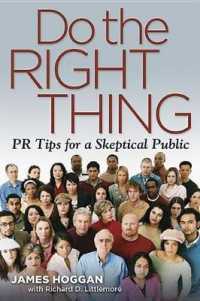基本説明
Provides healthcare professionals with a readily accessible source of information on the assessment and management of the psychosocial aspects of cancer.
Full Description
Publisher's Noteguaranteed by the publisher for quality, authenticity, or access to any online entitlements included with the product.A practical and comprehensive guide to fostering behavioral and emotional health in cancer patients - from one of the world's leading cancer treatment centers4 STAR DOODY'S REVIEW!"This is a very helpful guide for continuity of care in addressing these often silent issues with cancer patients. It also will assist in the often difficult conversations that need to take place with these patients, such as poor prognosis, failed treatment, or noncompliance."--Doody's Review ServiceReflecting the collective expertise of more than forty contributors, most from the renowned MD Anderson Cancer Center, this manual addresses key psychological and behavioral issues that should be considered when treating cancer patients, including special populations such as children and the elderly.Coverage includes:Communicating with patients and familyDistress and cancerAssessment and management of psychological symptoms, including mood disorders, anxiety, fatigue, substance abuse, and deliriumFamily and cultural issues, including spirituality and religion and supporting the caregiverIntegrative medicinePhysical medicine and rehabilitationGrief and end-of-life issues, including non-pharmacologic interventions and palliative medicineHealthcare professional wellbeingMD Anderson Manual of Psychosocial Oncology is designed to be a practical guide for clinicians and allied professionals in the day-to-day practice of psychosocial oncology, which is an essential component of the comprehensive care of cancer patients and their caregivers.
Contents
ContributorsPrefaceAcknowledgmentsSECTION I: DISTRESS AND CANCER1. The Clinical Psycho-oncology Assessment, James D. Duffy2. Stress and Cancer, Julie K. Allen, Guillermo N. Armaiz-Pena, andAnil K. Sood3. The Resilient Cancer Patient, Mark D. Gilbert4. The Clinical Assessment of Distress, Cindy L. Carmack, Patricia A. Parker, andEileen H. Shinn5. Mood Disorders, Alan D. Valentine6. Anxiety in Cancer Patients, Anis Rashid7. Delirium, James D. Duffy and Alan D. Valentine8. Nicotine Dependence, Maher Karam-Hage and Paul Cinciripini9. Substance Abuse and Cancer, Kathie Rickman10. Sexuality and Cancer, Mary K. Hughes11. Cancer-related Fatigue, Carmen P. Escalante and Ellen F. Manzullo12. Interface between Psychiatry,Sleep, and Cancer, Mary Rose and Rhonda Robert13. Psychosocial Approaches to Pain, Diane Novy and Laura M. van Veldhoven14. Neurobehavioral Side Effects of Cancerand Cancer Therapy, Mariana E. Witgert and Jeffrey S. WefelSECTION III: COMMUNICATING WITH PATIENTS AND FAMILIES15. Communicating with Patients and Families, Walter F. BaileSECTION IV: FAMILY AND CULTURAL ISSUES16. A Model: Supporting the Caregiverthrough the Crisis of Cancer, Phyddy Tacchi17. Spirituality and Religion Perspectiveson Illness and Suffering, David R. JenkinsSECTION V: SPECIAL POPULATIONS18. Children and Cancer, Rhonda Robert and Martha Askins19. Cancer and the Older Person, Sriram Yennurajalingam20. Survivorship, Karin Hahn21. Body Image and Disfigurement, Michelle Fingerette22. Physical Medicine and Rehabilitation, Benedict KonzenSECTION VI: INTEGRATIVE MEDICINE23. Integrative Medicine in Cancer Care, Richard Tsong Lee, M. Kay Garcia,M. Alejandro Chaoul, Laura Baynham-Fletcher,Lisa M. Gower, and Lorenzo CohenSECTION VII: GRIEF AND END-OF-LIFE ISSUES24. Nonpharmacologic Interventions, Steven Thorney and Debra Sivesind25. Palliative Medicine and the Cancer Patient, David Hui and Eduardo BrueraSECTION VIII: HEALTH CARE PROFESSIONAL WELL-BEING26. Health Care Professional Stress, James D. Duffy, Kenneth Sapire, andM. Alejandro ChaoulIndexNER(01): WOW








